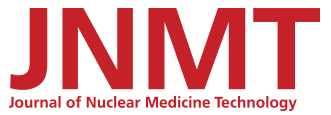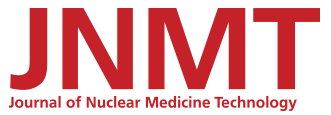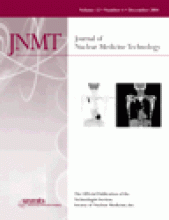
The first PET Specialty exam was administered on Saturday, September 18, 2004, at LaserGrade testing centers across the country. Like the NCT exam, administered on Saturday, August 14, 2004, Mother Nature played a cruel joke by denying some candidates at the peak of their exam preparation the opportunity to sit for the PET exam because multiple testing sites sustained hurricane damage or power outages. Two hundred and twenty-five technologists registered for the PET exam but only 195 were able to sit for the 4-hour exam that consisted of 205 questions, including 5 pretest items that will not be scored.
Due to hurricane and LaserGrade-related issues, NCT and PET candidates were offered the opportunity to take their exams on November 13.
A passing score for the NCT or PET exams is determined using the Modified Anghoff method. Let me take a moment to briefly explain that process for those not familiar with this method. Prior to the administration of the exams, a group of judges with clinical PET experience in a variety of clinical settings was asked to review each item and assign a decimal score from 0.0 to 1.0 based on the difficulty of the item (question). A score of 1.0 indicates that every minimally qualified candidate would answer the question correctly. A score of 0.25 indicates a significant level of difficulty. At the conclusion of this process, judges review the answer key and are allowed to change their scores as necessary. The aggregate scores are added and the summation of those scores determines the minimum passing score based on the projected difficulty of the exams.
At the time of this writing, exam results were not available; however, by the time this article is published, results will have been mailed and the NMTCB would like to congratulate our newest NCT technologists and our first PET technologists. You have successfully demonstrated your professional knowledge in the specialty area of nuclear cardiology or PET and should be very proud of your accomplishment. Watch for a full report on the NCT and PET exams in the February issue of Uptake and on the NMTCB website at www.nmtcb.org.
During the fall NMTCB meeting, the directors reviewed the many comments and suggestions received from current and past specialty exam candidates. As with any exam, a broad spectrum of comments and suggestions are always received and range from “the exam is too easy, beef it up” to “the exam is too hard, who knows all that stuff anyway?” The one comment that has been voiced by the majority of candidates sitting for the specialty exams is the need to improve the testing experience. Based on the increased volume of candidates for our specialty exams, the Board was able to obtain new proposals from a variety of testing vendors. Each proposal was carefully reviewed to ensure that the issues expressed by the candidates would be addressed and the testing experience would be improved. The Board selected ACT, Inc., as the new administrator of the NCT and PET exams. ACT is the same company that has administered the NMTCB’s entry-level exams for many years. The Board anticipates a significant improvement of the testing experience due to the professional environment provided by the ACT testing centers.
The NMTCB’s new continuing education and disciplinary policies were mailed to all members in the summer. At the fall Board meeting, the directors made minor changes to those documents to clarify procedures or more clearly define processes associated with the policies. Be sure to visit www.nmtcb.org to view the most current copy of those policies. The most recent version of these policies was published in the fall issue of the NMTCB News. If you have questions or need further clarification regarding the changes in these new policies, please review the Frequently Asked Questions document on the Web site or contact the NMTCB office at 2970 Clairmont Road, Suite 935, Atlanta, GA 30329, 404-315-1739.
The NMTCB continues to increase its participation in meetings and activities related to the practice of nuclear medicine technology, education, allied health, or other associations where information sharing may support our mission or where our input on exam expertise may be useful to others. Recent meetings that the NMTCB participated in include the Health Professions Network, the Association of Educators in Radiologic Sciences, Inc., the American Health Radiology Administrators, the Conference of Radiation Control Program Directors, and the Alliance for Quality Medical Imaging and Radiation Therapy.
Calling all nuclear cardiology, PET, and entry-level item writers! The NMTCB is always looking for volunteers to write questions for the entry-level, nuclear cardiology, and PET exams. The only qualification to write items for the entry-level exams is an active NMTCB certificate. Qualifications to write items for the NCT or PET exams include an active membership in the NMTCB or ARRT(N) and an active NCT or PET certificate. Contact the NMTCB office for an item-writers’ packet that includes detailed instructions for writing exam questions.
At the fall meeting the Board celebrated the contribution of our departing director, Lenna King, MS, CNMT. Ms. King served one term (4 years) on the Board of Directors and in that time period made significant contributions to the NMTCB website and to the Publication Committee that she chaired for several years. We wish her well as she completes her PhD, and we are looking forward to addressing her as “Doctor King” in 2005.
In 2005 the Board will welcome 3 new directors, David Gilmore, CNMT, David Perry, CNMT, and John Radtke, CNMT. Each new director brings to the Board a wealth of knowledge and experience that will enhance and support the many activities of the NMTCB.
The year 2005 promises to be another challenging year as new policies are implemented and the concept of “fused technology” continues to impact the imaging profession. I’m always available to answer your questions or discuss your comments or suggestions. Please feel free to contact me at ksthomas{at}earthlink.net.







